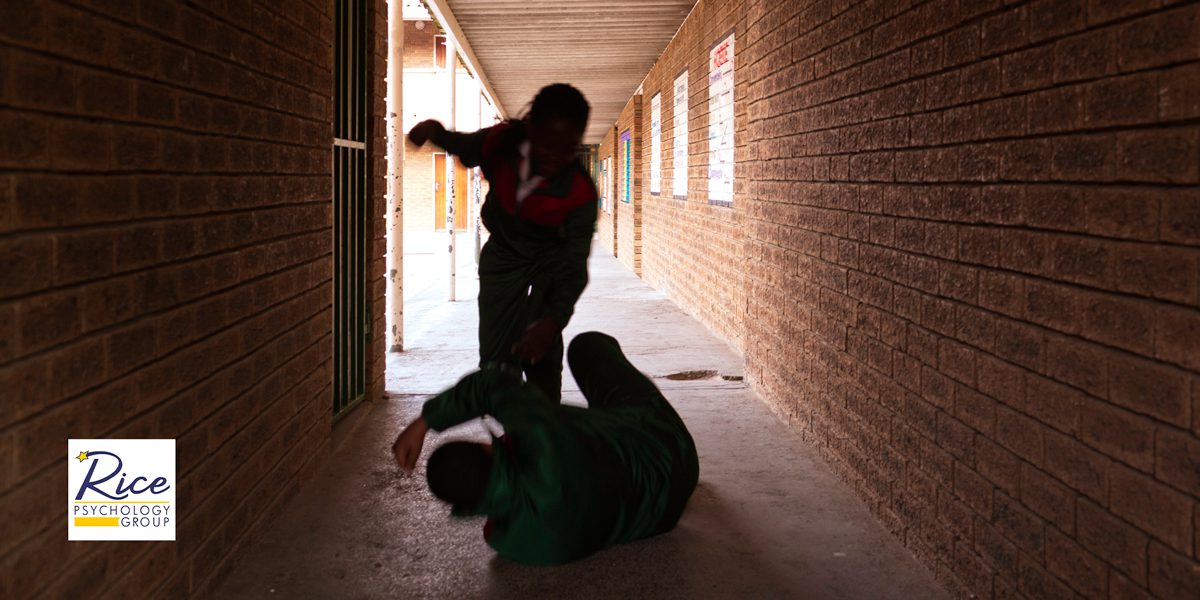Consider the following story as it relates to this week’s topic.
“I’m really worried about my son. Lately, it seems his personality and demeanor have changed, and I can’t figure out why. He’s always been a happy kid, but now he just comes home from school and goes straight into his room, shuts the door, and doesn’t want to come out. I try to talk to him to see what the issue is, but he’s just so closed off. At dinner, he hardly eats, and I can barely get two words out of him. I’m so worried and don’t know what to do!”

According to a study by the National Center for Educational Statistics, over 20% of American students aged 12 through 18 reported being bullied in 2017. Why are some kids bullied while others aren’t? It can be due to many reasons, but the most common include:
- Appearance
- Interests
- Academic scores
- Home life
- Social background
- Race
- Sexual orientation
- Religious beliefs
- Gender Identity
Bullying can lead to anxiety, depression, and other mental health issues. At Rice Psychology Group, we want to help you recognize the signs of a bullied child and what to do if your child is the bully.
A Watchful Eye
Few bullied kids ask for help, which is why it’s so important for parents to identify the signs of the act:
- “Losing” personal items like their phone or backpack (which may have been stolen by the bully)
- Mysterious bruises, scratches, or other injuries
- Ripped clothing
- A change or loss of appetite
- A decline in grades
- Asking to stay home or avoid school (more than usual)
- Increased complaints of headaches or stomachaches (due to stress)
- Trouble sleeping and/or nightmares
- Low self-esteem
- Self-destructive behavior like self-harming, running away from home, or thoughts of suicide
If you discover that your child is being bullied or otherwise repeatedly mistreated by another child or adult, we recommend telling them that you believe them and that what is happening is wrong and will not be tolerated.
Ask your child about what is taking place, including how often, where, and who else is around. Comfort him/her/they as best you can. Reach out to their teachers and school administrators but caution them to do their research discretely before they decide to take action. Most kids fear that telling an adult will just make their situation worse.
We understand that you’ll be angry and will want the person who is bullying your child to be punished, but remember that kids target other kids for a myriad of reasons which also need to be carefully considered.
What if Your Child is the Mean Kid?
Much like we take a proactive approach in helping bullied kids, we must also take a thoughtful look at the child who is doing the bullying. Why do they do it? It depends on the person, but a few common reasons that someone bullies are:
- Being bullied themselves
- Mental or physical abuse
- Peer pressure
- Poor self-esteem
- Jealousy
- Seeing others doing it and wanting to “fit in”
- Wanting to appear stronger and tougher (mostly seen in male bullies)
Sometimes, though, kids who bully others offer no clear-cut reason other than it’s “fun.” Apart from telling your children that bullying is an unacceptable action that has serious consequences at home and school, we suggest you:
- Take the Matter Very Seriously – Your children have to understand that bullying will not be tolerated. If you suspect your child of bullying, explain to him/her/they that their behavior is unacceptable and will be punished.
- Teach Your Kids to be Respectful – Instill a sense of empathy in your child. You can do so by encouraging them to spend time with children from different walks of life via volunteering or after-school programs.
- Learn About Your Child’s Social Life – Know the different factors that can contribute to your child becoming a bully. Learn about their circle of friends, the school environment, and if bullying is an issue in his/her/their social life.
- Lead by Example – The best way to introduce a positive outlook in your children is by being the best role model possible. Allow him/her/they to see that you interact with others with respect. And speak with them about how bullying can have some serious consequences for both the bullied and bully.
We Can Help!
We understand that your child means the world to you. No matter if they’re being bullied or are not treating others as you would like, know that our licensed psychologists and therapists in Tampa are ready to help. Contact us today for more information or to schedule an appointment.

